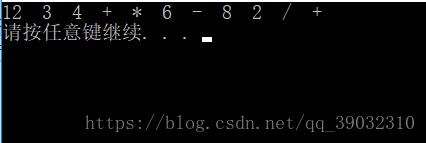中缀表达式转后缀表达式 ---- 代码实现
在之前的文章中提到了中缀表达式转换为后缀表达式,但是只提及思想没有代码实现,今天粗略实现了一下。
先了解思想,代码在最下面。
中缀表达式转换为后缀表达式
1.创建栈
2.从左向右顺序获取中缀表达式a.数字直接输出
b.运算符遇到’ ( ‘直接入栈,遇到’ ) ‘将栈中‘ ( ‘之后入栈的全部输出,同时‘ ( ‘出栈但是不输出。其他符号将符号栈中的元素依次出栈并输出,直到遇到比当前符号优先级更低的符号或者’ ( ‘,将当前符号入栈。
3.获取完后,将栈中剩余的符号依次输出
例如:12 * (3 + 4) - 6 + 8 / 2
依次获取:
12 ,是数字,直接输出
后缀表达式:12
符号栈:
’ * ’ ,是运算符,入栈
后缀表达式:12
符号栈:*
’ ( ‘,左括号,直接入栈
后缀表达式:12
符号栈: * (
3 , 数字 ,输出
后缀表达式:12 3
符号栈: * (
‘ + ’,运算符 ,入栈
后缀表达式:12 3
符号栈: * ( +
4 ,数字,输出
后缀表达式:12 3 4
符号栈: * ( +
‘ )’,右括号,栈中元素依次出栈并输出知道遇到左括号,并且左括号也要出栈且不输出
后缀表达式:12 3 4 +
符号栈: *
‘ - ’,操作符,减号的优先级低于乘号所以乘号出栈并输出,此时站内没有符号,减号入栈
后缀表达式:12 3 4 + *
符号栈: -
6 ,数字,输出
后缀表达式:12 3 4 + * 6
符号栈: -
’ + ‘,操作符 ,优先级与减号相同(也就是说没有减号的优先级高)所以减号出栈输出,加号入栈
后缀表达式:12 3 4 + * 6 -
符号栈: +
8 ,数字 ,输出
后缀表达式:12 3 4 + * 6 - 8
符号栈: +
‘ / ’,操作符,比减号的优先级高直接入栈
后缀表达式:12 3 4 + * 6 - 8
符号栈: + /
2 ,数字,输出
后缀表达式:12 3 4 + * 6 - 8 2
符号栈: + /
中缀表达式获取完后,将栈中剩余元素依次出栈输出
后缀表达式:12 3 4 + * 6 - 8 2 / +
符号栈:
以上就是中缀表达式转后缀表达式
/////MidTurnBack.h
#define max 10
typedef char DataType;
typedef struct Stack
{
int top;
DataType stack[max];
}Stack;
enum {Data,Ope,Left,Right} operate;
typedef struct Cell
{
enum operate op;
int data;
}cell;////MidTurnBack.c
void MidTurnBack(cell* arr, int sz)
{
Stack s;
int i = 0;
assert(arr);
StackInit(&s);
for (; i < sz; i++)
{
switch (arr[i].op)
{
case Data:
{
printf("%d ", arr[i].data);
break;
}
case Ope:
{
if (arr[i].data == '*' || arr[i].data == '/')
{
while (StackNum(&s) && (StackTop(&s) == '*' || StackTop(&s) == '/'))
{
printf("%c ", StackTop(&s));
StackPop(&s);
}
}
else
{
while (StackNum(&s) && StackTop(&s) != '(')
{
printf("%c ", StackTop(&s));
StackPop(&s);
}
}
StackPush(&s, arr[i].data);
break;
}
case Left:
{
StackPush(&s, arr[i].data);
break;
}
case Right:
{
while (StackTop(&s) != '(')
{
printf("%c ", StackTop(&s));
StackPop(&s);
}
StackPop(&s);
break;
}
}
}
while (StackNum(&s))
{
printf("%c ", StackTop(&s));
StackPop(&s);
}
printf("\n");
}/////test.c
int main()
{
cell arr[] = { {Data,12},{Ope,'*'},{Left,'('},{Data,3},
{Ope,'+'},{Data,4},{Right,')'},{Ope,'-'},{Data,6},{Ope,'+'},
{Data,8},{Ope,'/'},{Data,2} };
MidTurnBack(arr, sizeof(arr) / sizeof(arr[0]));
system("pause");
}上面代码中栈的基本函数可在
https://blog.csdn.net/qq_39032310/article/details/81950247 (栈的基本操作)中查看。
如果有什么疑问或者更好的提议欢迎留言。
